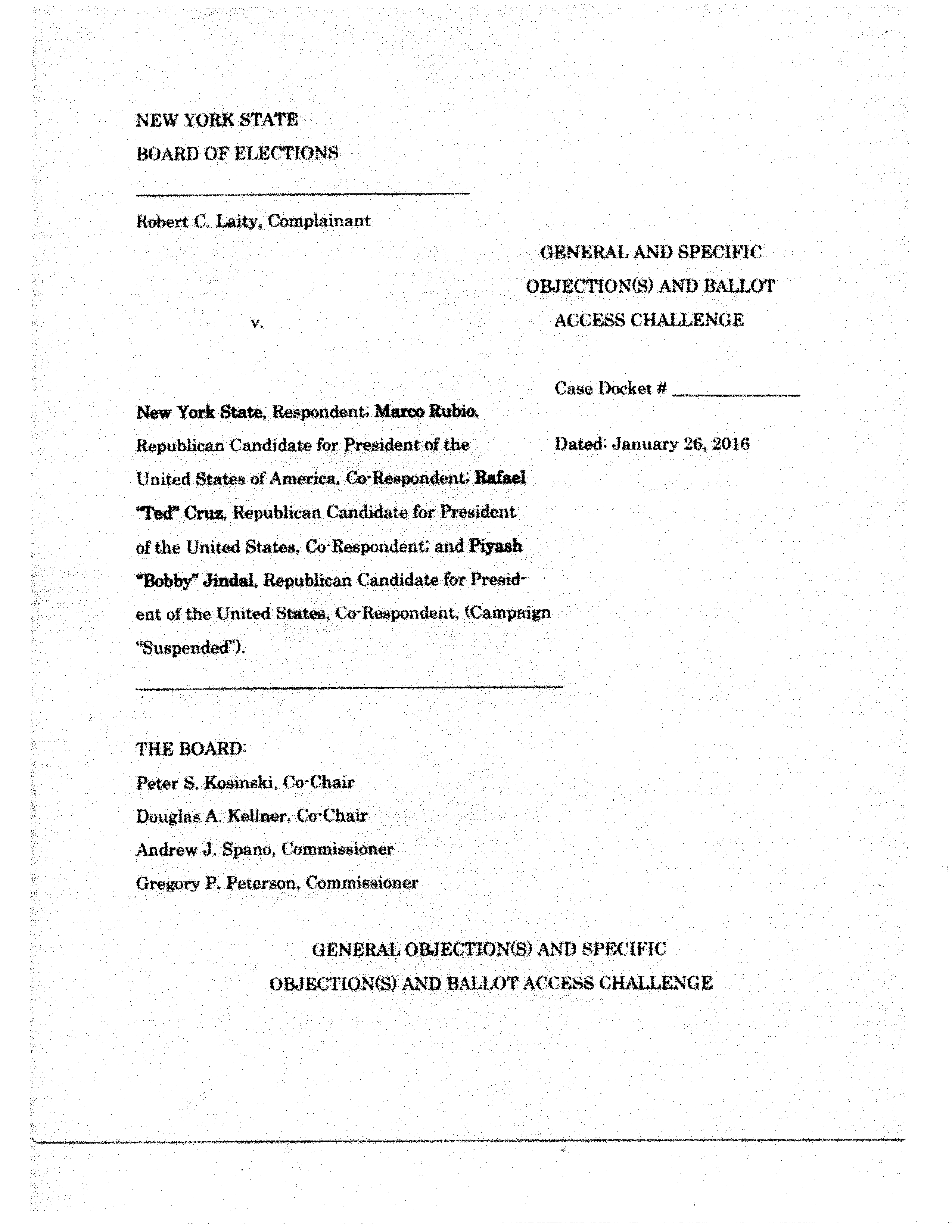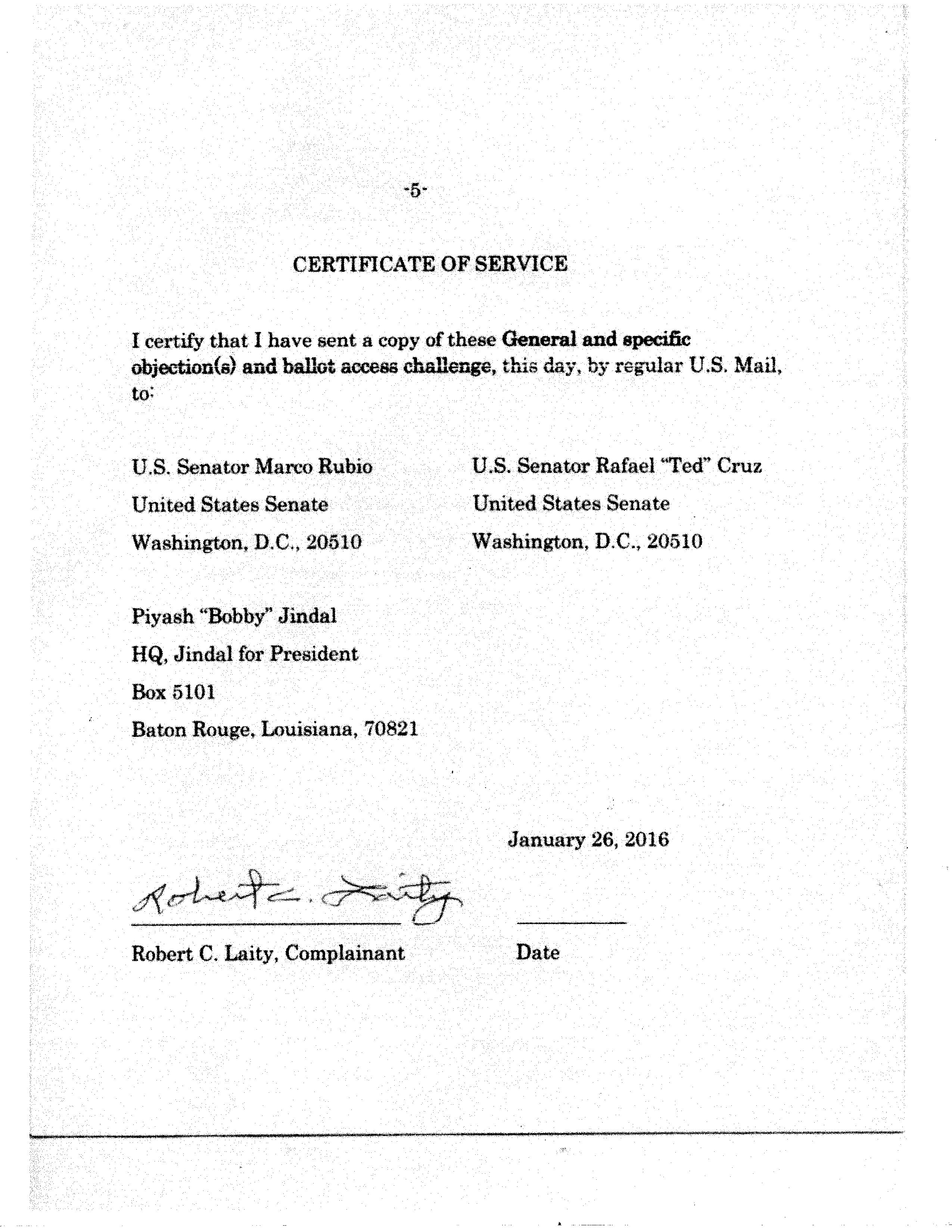“BORN IN THE U.S….TO PARENTS WHO ARE BOTH U.S. CITIZENS”
by Sharon Rondeau
 (Feb. 21, 2016) — On Tuesday, February 23, the New York State Board of Elections (NYSBOE) will be adjudicating three ballot challenges filed by as many New York residents against the presidential candidacies of Sens. Marco Rubio and Ted Cruz and former Louisiana Governor Bobby Jindal, who suspended his campaign in November.
(Feb. 21, 2016) — On Tuesday, February 23, the New York State Board of Elections (NYSBOE) will be adjudicating three ballot challenges filed by as many New York residents against the presidential candidacies of Sens. Marco Rubio and Ted Cruz and former Louisiana Governor Bobby Jindal, who suspended his campaign in November.
Cruz and Rubio were virtually tied for second place in the South Carolina primary according to results announced on Saturday night.
A number of ballot challenges and lawsuits claiming that Cruz is not a “natural born Citizen” have received attention from the mainstream media as the primary season has progressed, including in Texas and Illinois.
The NYSBOE incorrectly states that the citizenship requirement for the president of the United States is to be “born a citizen” rather than “natural born Citizen.”
Although the media refused to report on the numerous lawsuits and in 2012, ballot challenges asking that Obama’s eligibility be evaluated, considerable coverage of the “natural born Citizen” topic has been provided beginning last year as questions arose as to whether or not Cruz’s birth in Canada would preclude him from running.
Cruz maintains that he meets the Article II, Section 1, clause 5 “natural born Citizen” requirement mandated only for the president and commander-in-chief by virtue of his birth to a U.S.-citizen mother in Calgary, Alberta, Canada on December 22, 1970.
In August 2013, The Dallas Morning News reported that Cruz was born with dual Canadian-U.S. citizenship, after which Cruz’s spokeswoman, Catherine Frazier, claimed that Cruz had no knowledge of it. Cruz had said that he believed he would have had to have affirmed Canadian citizenship, but the government of Canada reportedly deemed him its citizen from the moment he was born.
Cruz claims to be a staunch supporter of the U.S. Constitution. Those challenging his eligibility say that the circumstances of his birth and/or parentage prevent him from meeting the higher standard of “natural born Citizen” as opposed to simply a “Citizen,” as is required of U.S. representatives and senators.
When Cruz ran for and won his U.S. Senate seat, he did not tell his potential constituents that he held dual citizenship, which was confirmed when he formally renounced Canadian citizenship in May 2014.
Trump has incorporated Cruz’s birth in Canada into some of his campaign speeches of late, having threatened to file a lawsuit himself to Cruz’s eligibility.
In 2011, Trump played a key role in the eventual release by the White House of Barack Obama’s “long-form” birth certificate to ostensibly prove his eligibility to serve as president, although within days, the image was declared a poor forgery by experts, a claim later confirmed by the Maricopa County, AZ Cold Case Posse in two 2012 press conferences.
On Friday, octogenarian and former U.S. Senator Robert Dole, who unsuccessfully ran against President Bill Clinton in 1996, told Fox News’s Neil Cavuto that he would not support Cruz’s candidacy because, among other reasons, he held Canadian citizenship when he assumed his U.S. Senate seat.
Cruz announced his candidacy on March 23 of last year, approximately ten days after two former solicitors general published an editorial in the Harvard Law Review contending that he meets the constitutional requirement of “natural born Citizen.” In their piece, Neal Katyal and Paul Clement make the case that anyone other than a naturalized citizen is eligible to serve as president.
Until 1934, U.S. citizenship law did not include inheritance of citizenship through one’s mother. In 1970, when Cruz was born, Canada did not recognize dual citizenship, although Cruz’s birth to non-Canadian citizens might have made for an exception.
Those questioning Obama’s “natural born” status beginning in 2007 have cited various media reports stating that Obama was born in Kenya or Indonesia. Additionally, Obama claims a father who was never a U.S. citizen, and research shows that historically, citizenship was passed to a child through his father.
Although some modern-day pundits and law professors have stated that the meaning of the term “natural born Citizen” was not defined by the Founders, others say that its meaning was clear to the men who wrote the Constitution between 1787 and 1789, following the American Revolution of 1776-1783.
Article II, Section 1, clause 5 reads, in its entirety:
No Person except a natural born Citizen, or a Citizen of the United States, at the time of the Adoption of this Constitution, shall be eligible to the Office of President; neither shall any person be eligible to that Office who shall not have attained to the Age of thirty five Years, and been fourteen Years a Resident within the United States.
The words “at the time of the Adoption of this Constitution” signify that even though the Founders knew they were not themselves “natural born Citizens,” they could qualify for the presidency by virtue of having declared themselves independent from Great Britain, fought the American Revolution, and become “citizens” of the new republic.
Robert Laity of Tonawanda, NY, a reader and contributor to The Post & Email, has challenged the constitutional eligibility of all three candidates with the Board of Elections and by sending a letter to the U.S. Senate Committee on Ethics. Last week, Laity contacted The Post & Email to inform us that in a follow-up phone call to the Senate committee, he learned that his letter had not yet been seen because of the circuitous route all mail must take to ensure security before delivery to members of Congress in their Washington, DC offices.
Bobby Jindal was born in Louisiana to two legal residents, but not citizens, of the U.S. Rubio was born in Florida into similar circumstances, as his parents did not naturalize until he was four years old.
Ballot challenges to Rubio and Cruz’s candidacies were heard in Indiana last week, with the decision that their names would remain on the state primary ballot. One of Cruz’s challengers, Robert Kern, focused on not only the “natural born Citizen” issue, but also on the fact that “the name he goes by — Ted — isn’t the same name that appears on his Canadian birth certificate: Rafael Edward Cruz.”
Challenges to Rubio and Cruz in New Hampshire prior to that state’s primary, one of which was filed by Laity, were also set aside. In September, a challenge to the candidacies of Cruz, Rubio and Jindal was filed in the state of Vermont, whose primary is March 1, along with a number of other states.
Laity posited in his New York ballot challenge that a natural born Citizen is one who is “born in the U.S. (U.S. Jus soli) in addition to being born to parents who are both U.S. Citizens themselves (Jus Sanquinis) [sic].”
Laity’s letter to the Senate Ethics Committee is as follows:
Laity’s filing with the New York State Board of Elections reads:
On Thursday, the Times-Union reported that Laity’s complaint was “the only one filed before the deadline.”








Update: The rejection of my ballot access challenge by the NYBOE has been appealed. An Index # was requested on 4/4/2016 in the matter of Laity v NY,Cruz,Rubio and Jindal seeking Injunctions against the respondent NY not to certify the delegates of the (3) GOP candidates and to keep them off the ballot. Meanwhile, my Senate Ethics complaint is being reviewed by the Senate Counsel at this time.